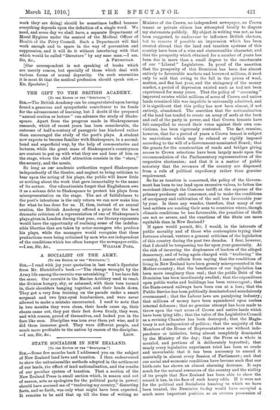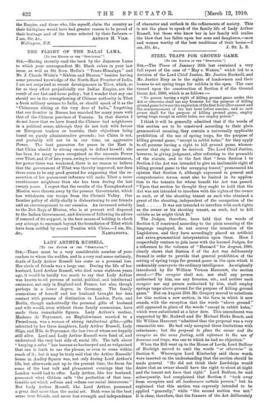STATE SOCIALISM IN NEW ZEALAND.
.. [To THE EDITOR OP THE " SPECTATOL1 SIR,—Some few months back I addressed you on the subject of New Zealand land laws and taxation. I then endeavoured to show the unbusinesslike methods adopted in the settlement of our lands, the effect of land nationalisation, and the results of our peculiar system of taxation. That a section of the New Zealand Press (a small section which, in season and out of season, acts as apologists for the political party in power) should have accused me of " traducing my country," distorting facts, and so forth, was only what might have been expected. It remains to be said that up till the time of writing no
Minister of the Crown, no independent newspaper, no Crown tenant or private citizen has attempted locally to dispute my statements publicly. My object in writing was not, as has been suggested, to endeavour to influence British electors, but to remove if possible an impression which has been created abroad that the land and taxation systems of this country have been of a wise and statesmanlike character, and that the prosperity which obtained for a number of years has been due in more than a small degree to the enactments of our " Liberal " Legislature. In proof of the assertion that the prosperity of this Dominion has been due almost entirely to favourable markets and borrowed millions, it need only be said that owing to the fall in the prices of wool, mutton, and flax last year, and the stringency of the money market, a period of depression existed such as had not been experienced for many years. That the policy of " resuming " improved estates whilst millions of acres of Crown and native lands remained idle was impolitic is universally admitted, and it is significant that this policy has now been almost, if not entirely, abandoned. The assertion that the nationalisation of the land has tended to create an army of serfs at the beck and call of the party in power, and that Crown tenants have felt compelled to record their votes against their own con- victions, has been vigorously contested. The fact remains, however, that for a period of years a Crown tenant is subject to restrictions which may be relaxed or rigidly imposed according to the will of a Government•nominated Board; that the grants for the construction of roads and bridges giving access to Crown selections have been largely made upon the
recommendation of the Parliamentary representatives of the respective electorates; and that it is a matter of public notoriety that the revenues of the country are dispensed from a role of political expediency rather than genuine. requirement.
So far as taxation is cuneerned, the policy of the Govern- ment has been to tax land upon excessive values, to fatten the- merchant (through the Customs tariff) at the expense of the- primary producer and consumer, and to make the conditions of occupancy and cultivation of the soil less favourable year- by year. Is there any wonder, therefore, that many of our beat settlers are sending their sons to countries where, though climatic conditions be less favourable, the penalties of thrift are not so severe, and the exactions of the State are more equitable than in New Zealand P If space would permit, Sir, I would, in the interests of public morality and of those who contemplate trying their fortunes abroad, venture a general criticism of the legislation of this country during the past two decades. I fear, however, that I should be trespassing too far upon your generosity. At the risk of incurring the displeasure of leaders of the alleged democracy, and of being again charged with " traducing" the country, I cannot refrain from saying that the conditions of living in New Zealand have been grossly misrepresented in the Mother-country ; that the beneficence of our legislation has • been more imaginary than real ; that the public Debt of the Dominion has been inordinately swelled; that the expenditure upon public works and buildings has been extravagant ; that the State-owned railways have been run at a loss ; that the Public Service has been politically dominated and scandalously overmanned ; that the Labour laws are paralysing industry; that millions of money have been squandered upon useless internal defences ; that no genuine attempt has been made to throw open the vast areas of Crown and native lands which have been lying idle ; that the value of the Legislative Council as a revising Chamber has beef], destroyed ; that the Magis- tracy is not independent of politics ; that the majority of the Members of the House of Representatives are without inde- pendence or initiative, being almost completely dominated by the Ministry of the day ; that the Press as a whole is muzzled, and portions of it deliberately boycotted ; that nearly every legislative experiment tried has been so crude and unworkable that it has been necessary to amend it materially in almost every Session of Parliament ; and that our social and economic conditions have become such that our birth-rate has shown an almost alarming decrease. It says much for the natural resources of the country and the virility of its people that New Zealand has been able to show the record it has, in the face of such heavy odds. If it were not for the political and Socialistic humbug to which we have been treated, the Dominion to-day would have occupied a much more important position as an oversee possession of ,
the Empire, and those who, like myself, claim the country as their birthplace would have had greater reason to be proud of their heritage and of the home selected by their forbears.—















































 Previous page
Previous page